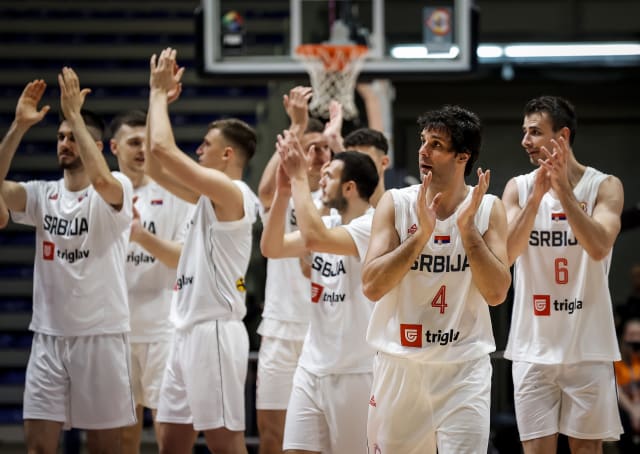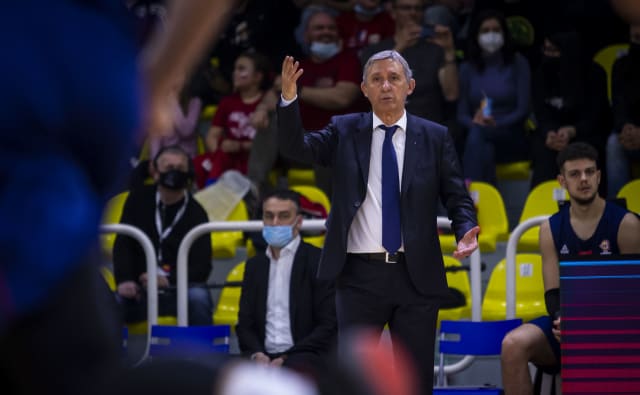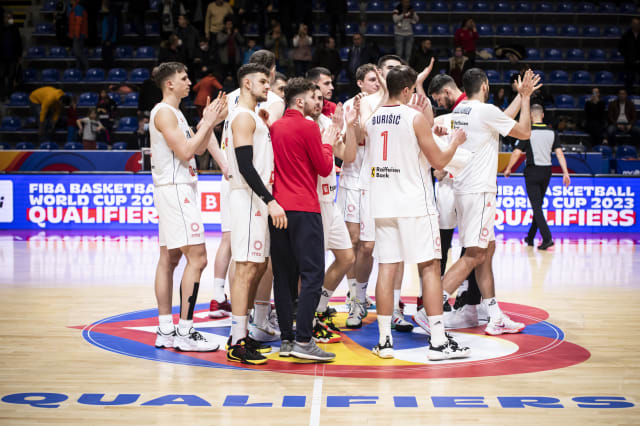A new Serbia blueprint: Pesic looks to the future, not the glorious past
BELGRADE (Serbia) -The summer of 2021 was marked by disappointment for the Serbian national team, but fans in the Balkan basketball powerhouse could hardly be more excited for the summer that lies ahead.
BELGRADE (Serbia) -The summer of 2021 was marked by disappointment for the Serbian national team, but fans in the Balkan basketball powerhouse could hardly be more excited for the summer that lies ahead.
In July, Serbia suffered a painful loss to Italy in the FIBA Olympic Qualifying Tournament at home in Belgrade and failed to qualify to the Tokyo Olympics.
A short period of introspection followed and, in late September, Svetislav Pesic was named as the new Serbia head coach, replacing Igor Kokoskov at the helm.
"We are interested in getting wins and results right now, but we are happy because we also have future potential, we have guys like [Balsa] Koprivica, [Nikola] Djurisic, or [Nikola] Jovic."
The news that the 72-year-old master tactician had taken the reins of the national team suddenly raised expectations all around Serbia. Pesic not only won both a FIBA Basketball World Cup and a FIBA EuroBasket crown with the former Yugoslavia, but also boasts a unique collection of trophies across the full range of FIBA youth competitions.
However, in an exclusive interview with FIBA.basketball, the highly-decorated Serbian coach reveals that while he wants to build on the past, he doesn't dwell on past achievements and his mind is firmly on the future.
Coach Pesic offered his views on the challenge of FIBA EuroBasket 2022, the qualification campaign for FIBA Basketball World Cup 2023 and his vision for the national team and Serbian basketball in general.
View this post on Instagram
What are your short-term and long-term goals after taking the reins of the Serbian national team?
Svetislav Pesic: Our short-term goals are clear. When you play to qualify to a competition the first and foremost thing is to be eligible to compete in that competition, in this case, the next FIBA Basketball World Cup. But it will not be easy, for obvious reasons.
We've beaten Slovakia twice, and we have two more difficult games, against Latvia on the road and against Belgium at home. We have theoretically qualified for the second phase but that does not mean anything because Turkey, Great Britain, and Greece will be waiting for us there. And those games are in the last week of August, in November and in February. It is unknown who will play for which team then, and nothing is certain yet, although we believe in our possibilities.
"Serbian basketball must look for a new identity that will adapt to the times we currently live in, because everything is changing, so the approach to basketball is also changing."
All of us in charge of the national team are looking to make the most of each gathering. We are at the beginning of the Olympic cycle and we want to qualify [to Paris 2024], and we had some negative experiences last time around, so we don't talk much ahead of time. It's not like we can show up a month before the Olympics and say we are winning a medal, we have to prepare for that in advance. I'm getting ready now, thinking in that way now.
I know this way, because I worked like that as the coach of Germany and later as the coach of Yugoslavia. Only the Finals are heard and seen and remembered in the media, and that's about it, but what had been done to get there, the fans and the media are usually not interested in that. But we are interested, most definitely.
In addition to securing qualification, are you also thinking about the national team's future and gradually including some young players?
That's right, in these games we give a chance to young players, who will generally develop if they remain healthy. At one point, they will become the pillars of the national team. [Milos] Teodosic or [Nemanja] Bjelica will not play for the rest of their lives, although we count on them for the upcoming competitions. But we have to think about the future, and since we have no other opportunity, we have to use these qualification games for that.
Of course we are interested in getting wins and results right now, but we are happy because we also have future potential, we have guys like [Balsa] Koprivica, [Nikola] Djurisic, or [Nikola] Jovic. More guys should be given a chance, and we hope that giving them a chance increases their motivation, develops their sense of responsibility and they continue to grow.
View this post on Instagram
Do fans expect you to pick up where you left off with Yugoslavia and continue the tradition of winning medals, only this time under the Serbian flag?
We may sometimes unjustifiably appropriate the results of Yugoslavia. Still, it has to be said that Serbian players and coaches deserve credit for those results, without excluding any participants from other countries of the former Yugoslavia.
But Serbian basketball must look for a new identity that will adapt to the times we currently live in, because everything is changing, so the approach to basketball is also changing. Yugoslav basketball gave us a philosophy for the selection and development of young players, and now we need to see how much we can still profit from that. However, many things have changed since then.
Jokic knows his value too well to care about opinions 🔥 pic.twitter.com/MHrghQy76r
— FIBA (@FIBA) April 28, 2022
What has been done in terms of player development and planning since you took the reins?
I think there are many things we should do, but we can't do everything at once. I always stick to some plan, an Olympic program. And it is not by chance that the Olympic Games are every four years, that it is a cycle. This shortened cycle allows us to reorient and organize quickly, and there are two essential things in our basketball.
The first is an absolute commitment to working with coaches. We sometimes have the misconception that players are created by parents, agents and the media. But what has not changed in this new era is that players are produced primarily by coaches, and everyone else should help the coaches. I have tried to create links with coaches from all over Serbia, through the coaching organization, so I can be there to see how it works with all youth national teams - U16, U18, U20 - that are going to play in the youth European Championships in the summer.
I try to be there for a few days, spend time with the players, see how they develop, how our coaches train them. So, we want to invite coaches, open the door to all possible forms of cooperation, help with all potential questions and issues, improve our training methods and adapt to new conditions and trends.
"National teams are still the locomotive of basketball development in a [European] country, the same way that the locomotive of the NBA is college basketball."
Second, as I have already stated several times, the Serbian league should be used in all cities to create the conditions for players to play in the best competition in Serbia, play basketball, and win. But, above all, to open the door to young players. That means keeping them here, not by force, but to offer them something - the opportunity to play, to have guaranteed contracts, to feel secure, to develop. And the same goes for coaches.
Developing players without a coach is impossible, and the development of clubs without a coach is also impossible. [The Serbian league] must be a professional league and the best-organized league in the country, according to the conditions that correspond to our financial capabilities. This is not Germany or Spain, but Serbia.
But we have always found creative ways to adapt to economic conditions and sporting conditions, and we have some habits that we have been creating here for many years. In short, it would be fantastic if we could solve the status of the coaches in this Olympic cycle. [....] We can't tell the national teams "play a tournament there, and whoever wins, let them take the medal."
Why? Because national teams are still the locomotive of basketball development in a [European] country, the same way that the locomotive of the NBA is college basketball. In our country, [the engine of development] is the national team and its successes. Because we, at European level, have competitions for the senior national teams, we have youth competitions for the U14s, U16s, U18s, U20s. Plus, we have U17 and U19 World Championships. So during the summer, all summer, young people play for their country.
Nikola Jokic probably deserves a special mention when talking about the Serbian national team. Where does he rank when compared to the previous generation of European stars in the NBA?
Nikola has a future. He is one of the players who progress every year. All those players are special, and it is difficult to say who is the best. I don't think there is [such a thing as] the best player or the best coach. There is only a [unique] identity by which they differ. They all lived in a different time, and basketball is changing.
The characteristic of the greatest players is that they change basketball. I have already said somewhere that Jokic and [Luka] Doncic are players who are changing the way the game is played in the NBA. [Vlade] Divac, [Arvydas] Sabonis and [Dirk] Nowitzki were all special, but they did not change the game like these two young men [Jokic and Doncic], who are still in the development phase.
Serbia will be one of the big favorites at FIBA EuroBasket 2022. There are many reasons for that, including your own reputation, the star players and of course the fact that Serbia reached the Final in 2017. What are your own expectations from that tournament and will Jokic play this summer?
We first need of course to see how we are when we finish the World Cup qualification window in late June - early July, but we already have in place our preparation plan for EuroBasket 2022. That process has already started. We are considering where we will prepare, which friendly games to play, and where. Our contact with the players doesn't stop, it might not be daily but it's consistent and regular, and we used these months to visit players, on NBA and Euroleague teams, who could not join us for the previous games, to talk about their plans and see how they feel.
I believe that poor preparation is preparation for failure, and that is why we have to prepare well and have a clear situation with the players. Of course, that means not only with Jokic, but also Bjelica, [Bogdan] Bogdanovic, [Boban] Marjanovic, [Aleksej] Pokusevski, and everyone who is playing here in Europe. We certainly have a broader, preliminary roster in mind, but now we have the most important part of the club season coming up in Europe and the NBA, and we will see how long it will last.
We are primarily interested in players who can mentally and physically respond to such challenges as the EuroBasket, where they play practically every day. It is the whole of August and the whole of September, which at the same time are the two most important months for the regeneration of players for what comes later in the new season.

Do you understand a player's point of view when they say that they can't play because they are tired after a tough club season?
Of course I understand. Last summer, we had the example of Nikola Jokic, within days of becoming a hero of the nation as the new NBA MVP. What can we do? We have short memory on this issue. All these players, including Jokic, all of them, have already shown the desire, will, and interest to play for the national team. They all went through the youth national teams, showing whether they wanted to play for the national team or not. And they did play.
We should mention that our people love basketball [to such a degree that they] identify with the success and failure of the national team and, of course, they are disappointed when one of our players cannot respond to the national team call. And I understand that.
The priorities of top players have changed, and it is a different way of life, and it is seen differently. But that doesn't mean that someone doesn't love their country.
Of course it is my job and desire for the national team program to make it interesting to the player and for the player to find some interest in all this. And it is to the interest of the best players, to train with the best and play against the best. So, his decision is based on thinking, 'can I be better by playing for the national team? If I can, then I play. If I can't, then it's hard for me.'
So far, I haven't met anyone who says that he won’t play, that he is not interested in playing for the national team. But I say that priorities change, people have families, they have tough seasons, and then [next year] a tough season will come their way again. It's just that they are people and, like all of us, they have some things that they don't want to tell the public about.
FIBA

